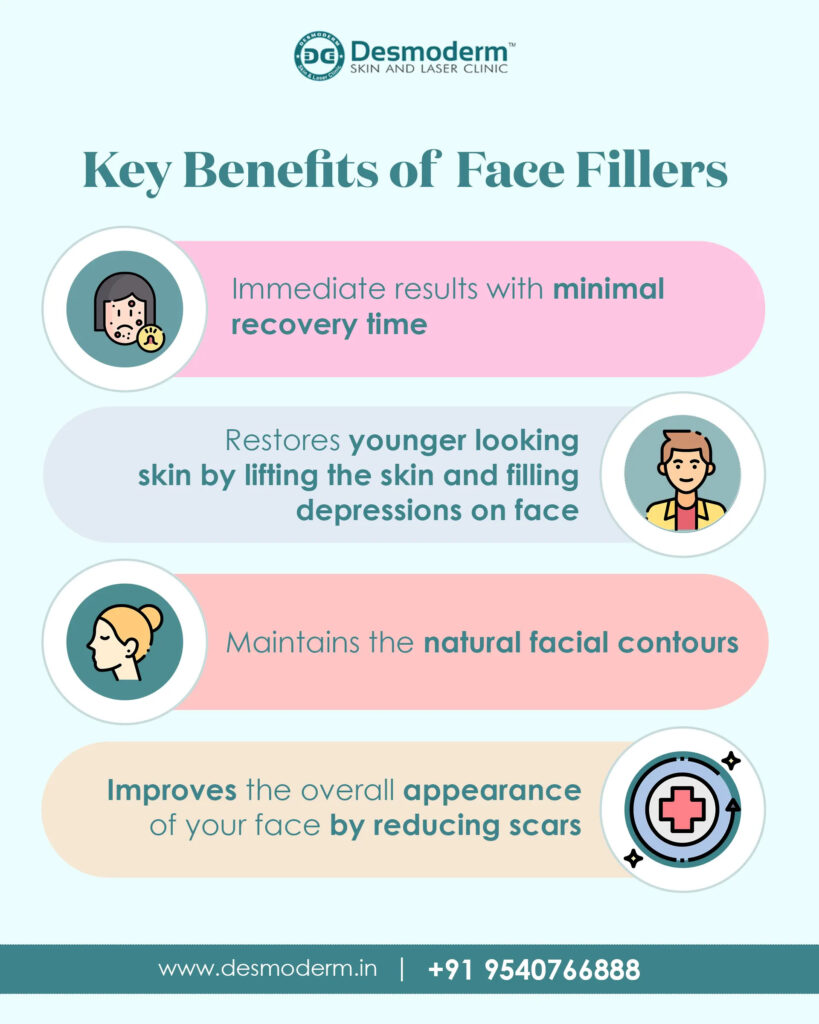Face fillers are cosmetic injections used for lifting and filling facial irregularities temporarily. These fillers can help to combat uneven areas in the skin, hollowness due to previous scars, or sagging due to the aging process.
As the meaning of face fillers suggests, they help to create a fuller and smoother facial appearance. They can be a very viable option if you are considering cosmetic treatments for a sprightly appearance. Keep reading to find out about them and what you need to know before deciding to get them done.
Feel free to skip ahead if one of the topics catches your eye:
- What are fillers made up of?
- How do face fillers work?
- What to avoid before filler injections?
- What to expect during treatment?
- How long do the results last?
- Dermal fillers cost in India
1. What are fillers made up of?
- Fillers are essentially made up of substances that volumize the skin.
- These substances may be natural or synthetic.
- One of the most widely used compounds is a naturally occurring polysaccharide known as hyaluronic acid (HA).
- HA is a substance that is naturally present in the skin.
- HA helps to keep the skin well fed and moisturized.
- Other components of a dermal or facial filler include calcium hydroxylapatite (CaHA), poly-L-lactic acid, polymethyl methacrylate (PMMA), or autologous fat injections.
- Some of the FDA-approved fillers used are Juvederm which includes Juvederm Ultra, Volbella, Volift, Voluma, etc.
- Restylane products available in the range are: Restylane, Restylane Lyft, Restylane Defyne, Restylane refine, Restylane volume
2. How do face fillers work?
- Facial structures are made up of skin, fat, muscle, and bone.
- As we age, the skin loses the volume of these facial components.
- This loss in volume causes changes in facial features including jawline changes, wrinkles, saggy skin, and loss of tone.
- Facial fillers use the right ingredients to supply the skin with substances that help to regain facial volume.
- Most of the signs of skin aging occur due to the lack of moisture in the skin.
- Facial fillers such as hyaluronic acid are highly hydrophilic in nature, i.e., they have a high affinity for water hence attract a lot of water.
- One gram of hyaluronic acid can retain up to 6 liters of water.
- Facial fillers help to fortify the skin and diminish the obvious appearance of fine lines and wrinkles.
- They are tissue-friendly and blend well with the skin.
- The face fillers help to smoothen out the fine lines around the nose and the mouth.
- They improve the volume and enhance the appearance of sunken cheeks.
- The symmetry of the facial features is augmented with the use of face fillers.
- The results of a dermal filler are long-lasting and stay for about 9-18 months depending on the type of filler used.
- Dermal fillers are a great way to enhance your appearance that involves no downtime
- The results are instantly visible right after the injection.
3. What to avoid before filler injections?
Once you decide to get dermal fillers, you need to keep in mind certain pre-treatment instructions. The following are a guideline on what to avoid before filler injections:
- Avoid any blood-thinning medications that you may be taking such as aspirin, Aleve.
- Avoid drinking about 24 hours preceding the time leading to the surgery.
- Smoking is best to be avoided.
- No makeup is advised on the day of the filler injections.
- Take no supplements such as garlic, primrose oil, ginseng, and Vitamin E, starting a week prior to the dermal filler injection session.
- Avoid the use of any skin creams that contain tretinoin (Retin-A), retinol, retinoids, glycolic acid, or any other anti-aging ingredients.
- Avoid resorting to any hair removal procedure such as bleaching, waxing, tweezing, epilation, or any hair removal creams.
- If you are pregnant, you have to postpone the dermal filler session for a safe time after the baby’s birth.
- Breastfeeding women are advised not to receive dermal fillers treatment.
- If you have a history of sores, acne, or herpes simplex, inform your dermatologist about it
- Avoid getting any dental procedures done prior to 2 weeks of the face filler session.
- Do let the dermatologist know if you have any infection such as dental, ear, or urinary tract.
- Avoid the intake of green tea a week prior to the session.
4. What to expect during the treatment?
- The dermal filler session is an outpatient procedure
- It may take about 40 minutes to 1 hour.
- Prior to the procedure, your facial features will be analyzed in an assessment session and your skin tone will be examined.
- You will be shown face filler before and after pictures to give you a general idea.
- Pictures of the face will be taken for documentation before the face filler session.
- The points on the face where the filling is to be done are marked.
- The site of the facial filler injection is disinfected using an antibacterial agent
- For making the session as pain-free as possible, the skin in the area is numbed using an anesthetic ointment, cold is applied or a local anesthetic is administered.
- Injections are given at the marked sites which takes a few minutes only.
- Additional fillers are administered, as needed.
- After making sure the results fulfill the expectations, the marked areas are cleansed.
- An ice pack is useful to help reduce any discomfort.
5. How long do the results last?
Some fillers last about 6–12 months while a few others may last up to 3–4 years. Here are a few tips to make the results last longer:
- Avoid facials, steam, sauna as far as possible post fillers.
- Avoid exfoliation and heavy rubbing immediately after face fillers.
- Stay well hydrated.
- Choose a moisturizer with hyaluronic acid to maintain the plump skin.
- Maintain the results of the session by using collagen building and antioxidants after consulting your dermatologist.
- Products containing retinol, collagen peptides, etc., help to enhance and keep the results longer.
- Use sunscreen protection with a broad spectrum UV cream.
- Utilize a blue light filter for your electronics to prevent skin damage.
- Take the right multivitamins and keep a healthy diet.
Dermal fillers cost in India
Getting a dermal filler done in India may cost between INR 15,000 and INR 1,25,000. The cost will depend upon:
- The type of dermal filler used
- The quantity of filler needed
- Surface area to be treated
- The skill and expertise of the dermatologist
Takeaway
Desmoderm provides quality healthcare services, including the latest in the field of dermatology to the masses. Schedule an appointment with Dr. Ranjan Upadhyay, the Best dermatologist in south Delhi for all your dermatological needs and receive the best in skincare.



